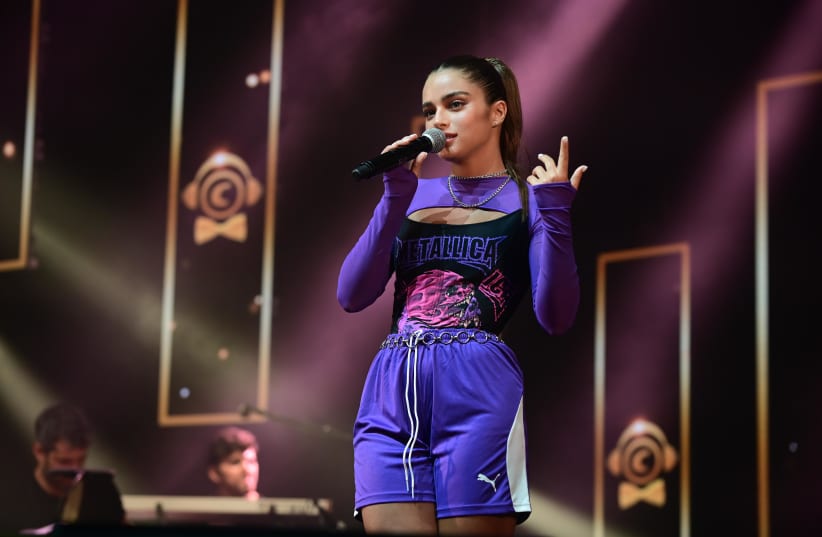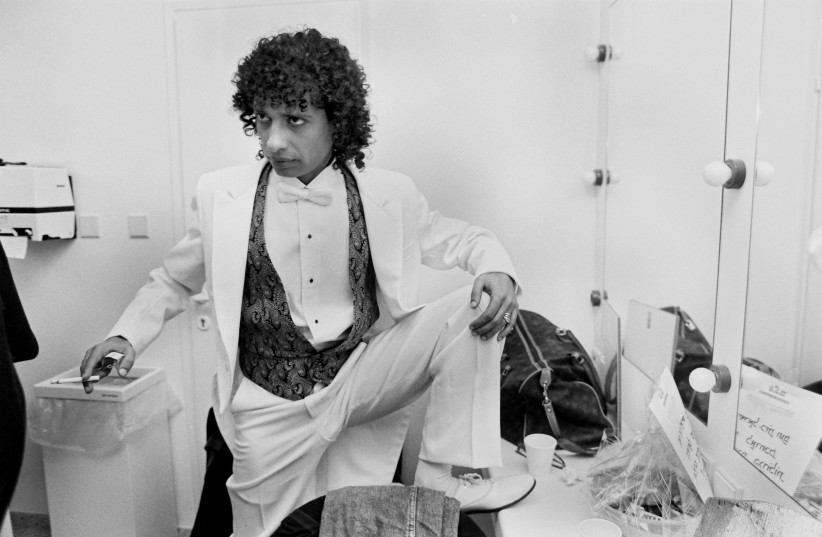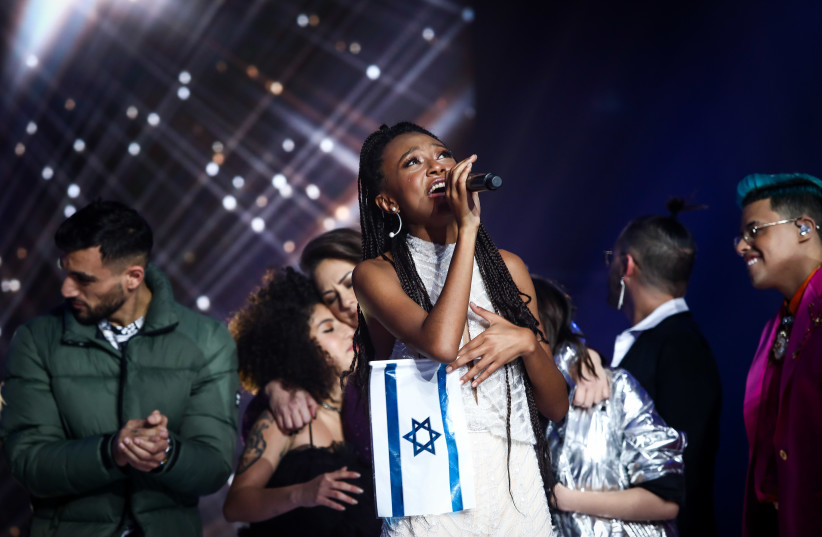Israel made history 50 years ago when it became the first non-European country to join the renowned song competition that has captivated audiences across Europe for decades. Since then, Israel has participated 46 times in the Eurovision Song Contest, winning four times and hosting the event three times.
One of Israel’s most memorable years in Eurovision was in 1979, when it found itself in second place, trailing behind Spain by a single point. As the votes were tallied, Spain was the last to submit its scores. In a thrilling twist of fate, Spain ultimately awarded 10 points to Israel, securing its victory that year.
Over the years, Israel has submitted a plethora of memorable songs to the Eurovision stage. To determine the cream of the crop, the Magazine conducted an extensive listening session with the help of several people and narrowed down the songs to the top 10 that the country submitted to the song contest between 1973 and 2023.
10. “A-Ba-Ni-Bi” by Izhar Cohen and the Alphabeta (1978)
Despite being relatively unknown on the international stage, Izhar Cohen and the Alphabeta’s upbeat performance and catchy tune captured the hearts of audiences across Europe. The song, which featured a blend of disco, funk and Middle Eastern musical elements, was a standout among the more traditional entries of the night and won the contest.
“A-Ba-Ni-Bi” remains a beloved cultural touchstone in Israel and attests to the power of music to bring people together across borders and cultures. And for Cohen and the Alphabeta, their Eurovision victory in 1978 will forever be remembered as a defining moment in their career and in the history of Israeli music.
9. “Olé Olé” by Izhar Cohen (1985)
It’s hard not to feel uplifted and energized when listening to Izhar Cohen’s “Olé Olé.” This iconic Israeli pop hit, released in 1985, is a master class in infectious hooks and catchy beats, guaranteed to have you tapping your feet and clapping your hands in no time.
From the opening notes of the song, it’s clear that this is a track designed for maximum impact. The driving rhythm and upbeat melody combine to create an irresistible groove that will have you moving and grooving from start to finish. And when the chorus hits, with its sing-along lyrics and infectious call-and-response structure, it’s impossible not to join in.
But what really sets the song apart is its cultural element. The song’s title, which translates as “going up,” is a nod to the Jewish tradition of immigrating to Israel. And the lyrics, which speak of a journey from one place to another, reflect the experiences of many who have made this journey in search of a better life.
8. “Hallelujah” by Milk and Honey (1979)
When Israeli pop duo Milk and Honey took the stage at the 1979 Eurovision Song Contest, they had no idea that their performance of “Hallelujah” would go down in history. But with its soaring chorus, infectious melody and timeless lyrics, the song captured the hearts and minds of millions around the world and became an instant Israeli music classic.
In the decades since it won the contest, “Hallelujah” has become a beloved classic with countless covers, remixes and adaptations paying tribute to its enduring appeal. And for many fans, the song remains a powerful symbol of hope and inspiration, a reminder of the beauty and wonder of life and the importance of cherishing every moment we have.
So whether you’re a lifelong fan of Milk and Honey or discovering “Hallelujah” for the first time, there’s no denying that enduring appeal of this timeless classic, a song that captures the spirit of a nation and the power of music to move us, inspire us and bring us together in celebration of all that makes life worth living.
7. “Set Me Free” by Eden Alene (2021)
As the first Ethiopian-Israeli artist to represent Israel at Eurovision, Eden Alene was determined to make her mark with a bold and empowering anthem that would inspire a new generation of music fans and show the world what she was made of. And with “Set Me Free” in 2021, she did just that.
From the moment that it begins, “Set Me Free” is a force to be reckoned with, as Alene’s powerful vocals and infectious energy drive the song forward. As the world continues to grapple with the challenges of the 21st century, the song’s message of empowerment and self-love remains as relevant as ever, a powerful reminder of the importance of embracing our own unique identities and standing up for what we believe in, no matter what obstacles may be in our way.
6. “Toy” by Netta (2018)
For Israeli teens and young adults, “Toy” quickly became a beloved staple, with its message of individuality and self-confidence resonating deeply with a generation that was hungry for change. The song’s upbeat tempo and catchy chorus made it an instant hit on dance floors and radio stations across the country, while its bold and colorful visuals helped to make it a cultural touchstone for a new era of Israeli music.
But the song, which won the Eurovision contest in Lisbon in 2018, was more than just a catchy pop song. Its lyrics, which speak of breaking free from the constraints of society and embracing one’s own unique identity, strike a chord with a generation that was tired of being told what to do and how to live. And for many young Israelis, Netta Barzilai became a symbol of hope and inspiration, a shining example of what it means to be true to oneself and stand up for what you believe in.
Since its release, “Toy” has become a global phenomenon, inspiring countless covers, remixes and dance routines, especially on TikTok.
5. “Feker Libi” by Eden Alene (2020)
Alene’s original Eurovision 2020 submission song, “Feker Libi,” is unique for its use of multiple languages of English, Amharic, Arabic and Hebrew, reflecting the diverse cultural heritage of the singer.
The song is a celebration of diversity and an invitation to embrace cultural differences. The use of multiple languages in “Feker Libi” sends a powerful message of unity and acceptance, highlighting the cultural richness and diversity of Israel, where people of different ethnic and linguistic backgrounds live together.
Toward the end of the song, Alene switches to Arabic, a language commonly spoken in Israel. She sings, “Don’t be afraid of the past, don’t be afraid of what’s to come, let us live for tonight.”
Her decision to include her Ethiopian heritage in the song is significant, as Ethiopian Jews have often faced discrimination and marginalization in Israel. The song is a celebration of diversity and an invitation to embrace cultural differences.
Although COVID-19 got in the way of Eurovision that year, “Feker Libi” has still been a fan favorite.
4. “Diva” by Dana International (1998)
“Diva” is a powerful and iconic Eurovision song performed by Dana International, who is also known for being a trailblazing transgender artist. The song, which won Eurovision in 1998 for Israel, has become a symbol of strength and empowerment for the LGBT+ community.
Dana International’s performance of “Diva” at the Eurovision Song Contest was a groundbreaking moment in the history of the competition, as it marked the first time that an openly transgender artist had won the contest. The song’s lyrics, which celebrate individuality and self-confidence, have resonated with audiences around the world, making it a beloved anthem for the LGBT+ community.
Dana International’s success with “Diva” helped pave the way for greater visibility and acceptance of transgender individuals in the music industry and beyond. Her unwavering commitment to her artistry and her courage in living her truth continue to inspire countless individuals around the world.
3. “Hasheket Shenish’ar” by Shiri Maimon (2005)
Shiri Maimon’s “Hasheket Shenish’ar” was Israel’s entry for Eurovision in 2005, and it quickly became one of the most memorable performances in the competition’s history. The song, which translates as “the silence that remains,” is a ballad about heartbreak and loss, with lyrics that are both poignant and poetic.
But what truly set this performance apart was Maimon’s incredible vocal talent. From the very first note, she commanded the stage with her powerful voice, effortlessly hitting every high note and infusing the song with raw emotion.
Throughout the performance, Maimon’s vocals were stunningly beautiful, at times soaring and at others delicate and tender. The way she effortlessly transitioned between these different styles attests to her remarkable vocal range and control.
As the song built, Maimon’s voice became even more powerful, filling the arena in Kyiv with a sense of passion and intensity that was truly awe-inspiring. It was a moment that has been etched into the memories of Eurovision fans around the world and one that continues to be celebrated to this day.
The 2005 Eurovision hit is a testament to the power of music and the human voice. Her incredible vocal talent, combined with the emotional depth of the song, created a performance that was beautiful and unforgettable. It’s a moment that will forever be remembered as one of the greatest in the history of Eurovision and a highlight of Maimon’s career as a singer.
2. “Kan” by Duo Datz (1991)
Performed by Orna and Moshe Datz at Eurovision in 1991, which was held in Rome, “Kan” is a beautiful and emotional ballad that showcases Orna’s stunning vocal abilities. The lyrics, which are in Hebrew, talk about a person’s desire to live life to the fullest and make the most of every moment. The song’s message of hope and optimism struck a chord with audiences, and “Kan” came in third in the contest with a total of 139 points.
One of the most memorable aspects of the song was the performance itself. The Datzes wore white and stood on a simple, understated stage. They were joined by a small choir, and the focus was solely on the song and its emotional impact. This was a departure from the more flamboyant and theatrical performances that had become common in Eurovision, and it helped make “Kan” stand out.
The Datzes became national heroes overnight, and “Kan’’ remains one of the most loved and iconic Eurovision songs of all time.
Overall, “Kan’’ by Duo Datz is a beautiful and emotional song that captured the hearts of Eurovision audiences. Its message of hope and optimism, coupled with Orna’s stunning vocals, continues to resonate with listeners to this day.
1. “Chai” by Ofra Haza (1983)
Ofra Haza’s “Chai” is a timeless masterpiece that continues to inspire and impact Israeli culture today. Released in 1982, the song quickly became a sensation and an anthem for the people of Israel.
At the time of its release, Israel was going through a turbulent period marked by political turmoil, economic hardship and social unrest. “Chai,” which means “alive” in Hebrew, was a call to action for the Israeli people to rise above its challenges and embrace life with passion and energy.
The song’s lyrics, written by Ehud Manor, are a celebration of life and the joys of living. Haza’s soulful vocals and the upbeat rhythm of the music perfectly captured the song’s message of resilience.
But “Chai” was more than just a catchy tune. It was a cultural phenomenon that brought together Israelis from all walks of life. The song became an instant hit, playing on the radio and performed at weddings, bar/bat mitzvahs and other parties, cementing its place in Israeli culture.
The story behind it? The Eurovision had taken place in Munich in 1983, 11 years after the Munich Massacre in which 11 Israeli athletes were murdered by eight terrorist members of the PLO’s Black September group.
In an interview in 1985, Haza told Maariv that before the competition, she visited a concentration camp in Dachau. “I was moved when I sang in Germany ‘Am Yisrael Chai,’ and I thought of an elderly couple I met in Dachau,” she said. “They told me: When you stand on the stage, remember us, who passed through Dachau.”
And indeed, in 2021, Walla reported that while performing, Haza brought five people on stage to represent the number six, as in six million Jews who were killed during the Holocaust.
The impact of “Chai” went beyond the music industry. The song’s message of hope and resilience resonated with Israelis facing difficult times, inspiring them to overcome their challenges with determination and strength.
Today, “Chai” remains a beloved classic in Israeli music, and its impact can still be felt throughout Israeli culture. The song’s message of living life to the fullest and embracing the challenges that come with it is just as relevant today as it was when it was first released.
Honorable mentions
★“Ey Sham” by Ilanit (1973)
Ilanit’s “Ey Sham” is a timeless classic that speaks to the deep longing and hope for peace in the Middle East. With its haunting melody and poignant lyrics, the song evokes both sorrow and resilience, reminding us that despite the challenges, there is always room for hope and reconciliation. Ilanit’s powerful vocals have made her one of Israel’s most beloved music icons and continue to resonate with audiences around the world, as well as carrying the legacy of being Israel’s first Eurovision submission.
★ “At Ve’ani” by Shlomo Artzi (1975)
A classic Hebrew ballad by Shlomo Artzi, “At Ve’ani” speaks of longing, love and companionship. Released in the late 1970s, the song has become a beloved piece of Israeli musical history, still played widely today at weddings and celebrations. Artzi’s emotive voice and heartfelt lyrics make it timeless, to be cherished for generations to come.
★ “Golden Boy” by Nadav Guedj (2015)
“Golden Boy,” the breakthrough hit by Nadav Guedj, has captured the hearts of music lovers worldwide. The catchy pop anthem’s upbeat tempo and smooth vocals create a perfect fusion of fun and feel-good vibes. Its international success and chart-topping popularity have made it an instant must-have on any party playlist. With this electrifying hit, Guedj has made his mark on the music scene and is sure to continue wowing fans.
★ “Unicorn” by Noa Kirel (2023)
Since its release, “Unicorn” has become a cultural phenomenon in Israel and beyond. The song’s message of self-love and empowerment has resonated with listeners of all ages and backgrounds.
“Unicorn” is a powerful anthem for feminism and individuality, encouraging women to embrace their unique qualities and challenge societal expectations.
The lyrics and smooth vocals capture the ears of anyone listening.
With its inspiring message and memorable melody, “Unicorn” has become a cultural touchstone, inspiring women to be proud of who they are and to never be afraid to show it.
Good luck to Kirel in this year’s Eurovision Song Contest in Liverpool!


